Blood, sweat, and tears were shed last Wednesday evening in Manchester as Barcelona left with an underwhelming 1-0 victory over a Manchester United side that looked bereft of attacking impetus but put on a strong defensive display. The Catalan side probed and pressed at will with Lionel Messi and Luis Suárez barraging the Manchester United defence with an onslaught of shots.
An early own goal after some exceptional work from Suárez may have set the tempo early on, but Manchester United held firm and produced an impressive performance limiting them to one goal. This tactical analysis will preview the second leg between Barcelona and Manchester United in the UEFA Champions League quarter-final.
The Red Devils were picked apart in places with Ashley Young particularly poor on the night having been dispossessed 30 times and failed to accurately find 11 crosses. However, performances from Scott McTominay, Fred and Chris Smalling gave the fans something to write home about.
The midfield duo’s performance was the biggest positive to come out of Old Trafford. McTominay deputised for the injured Nemanja Matić and put in another breakout performance. The faith shown by Ole Gunnar Solskjær and José Mourinho before him has been vindicated. The Scot could become the next Michael Carrick with his humble demeanour and no-nonsense attitude.
Team News
Barcelona
Having played a second-string side against Huesca, Barcelona looked to rest several key players including Lionel Messi and Sergio Busquets. Gerard Piqué and Luis Suárez were suspended, while Ivan Rakitić was out with a fever forcing Ernesto Valverde into rotating in his fringe players. Being so far ahead in La Liga, Valverde was prepared to drop points against Huesca in an effort to keep his players fresh for the return leg at the Camp Nou.
For Barcelona, Ousmane Dembélé should return in place of Philippe Coutinho with the rest of the side retaining their places. Malcolm could come on sooner to try and put Manchester United under more pressure, as they looked troubled by the pace of Barcelona’s full-backs.
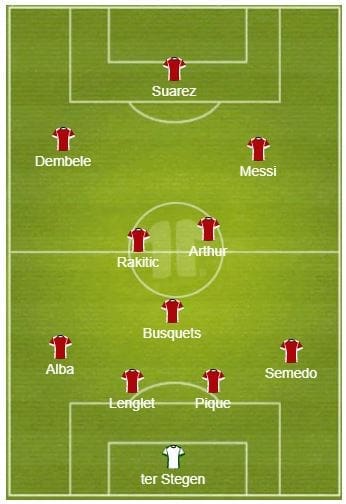
Manchester United
Having only narrowly lost to Barcelona in the first leg, Ole Gunnar Solskjær should look to persist with the same team. Even though the attack failed to produce a shot on target, Manchester United’s attacking trident can produce. With Matić expected to be fit again Solskjær will have a tough decision to make, but one that in reality shouldn’t require too much thought. Scott McTominay deputised brilliantly and deserves a start in the second leg.
If the Paris Saint-Germain result taught us anything it’s that Romelu Lukaku and Marcus Rashford have the ability to counter-attack at lightning speed and cause defensive problems. Diego Dalot impressed as did Chris Smalling, Fred, and McTominay and should all retain their places in the starting XI. A suspension to Luke Shaw will force Manchester United into changes in defence. This could signal another start for Marcos Rojo or Phil Jones.
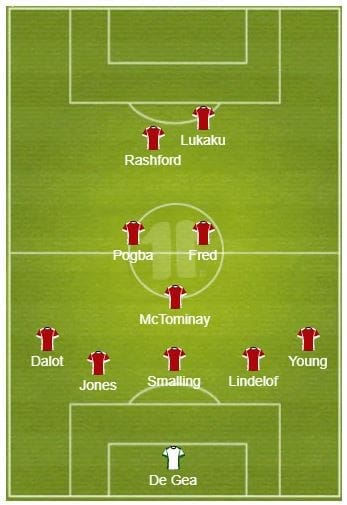
Pivotal moments for Barcelona
Nélson Semedo and Jordi Alba’s influence was more apparent as the game wore on. The two Barcelona full-backs were Barcelona’s main creative outlet as Manchester United closed out any movement through the middle.
United failed to have any shots on target throughout the 90 minutes and more often than not used the pace of Diego Dalot and Marcus Rashford to pin Barcelona back on the counter-attack. Forward runs by Dalot and United’s general compact positioning allowed Semedo space to play in behind and have lots of joy combining with Suárez.
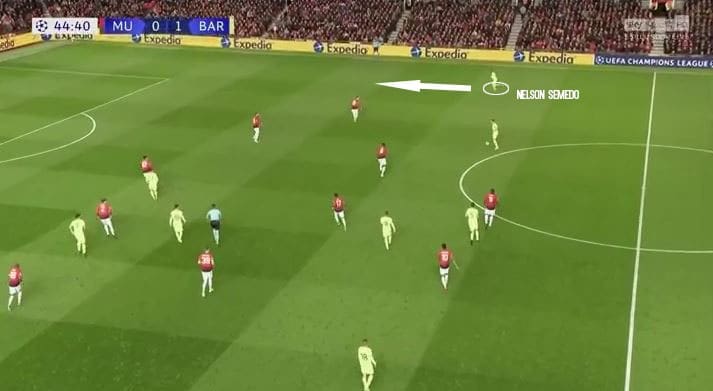
Here we can see Nélson Semedo in acres of space during one of Barcelona’s build-up phases. Once he receives the ball he is able to move into a one-on-one situation against the defender. You would favour Semedo with his pace up against Dalot in a foot race, but it isn’t just the space in behind that he’s exploiting. You can see how Paul Pogba has moved across to support Dalot, opening up a potential space for Messi to move into.
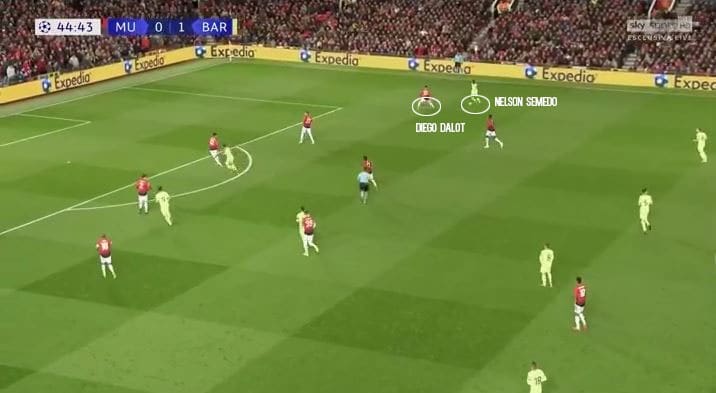
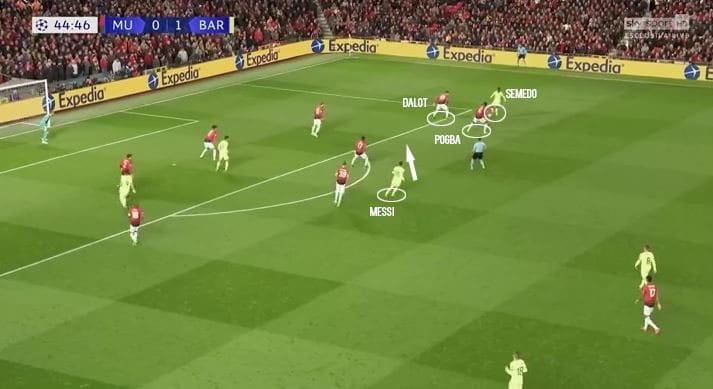
Speed merchant: Ousmane Dembélé
The first leg saw Semedo’s pace cause Manchester United all sorts of problems and only once he found space in behind did Barcelona start to settle. Even with Philippe Coutinho’s recent improved performances, Dembélé’s presence in the starting XI is critical to Barcelona’s playing style up front. With Messi timing his runs and Suárez linking well with the midfield, Dembélé brings a combined pace and direct dribbling to the team that is effective both on the counter-attack and in dominating possession.
With a 2.62 KP90 (passes leading to shots per 90 minutes), Dembélé’s influence as a winger who is able to get in behind his full-back to send crosses in is evident. The league average is 1.55, making his contribution even more important.
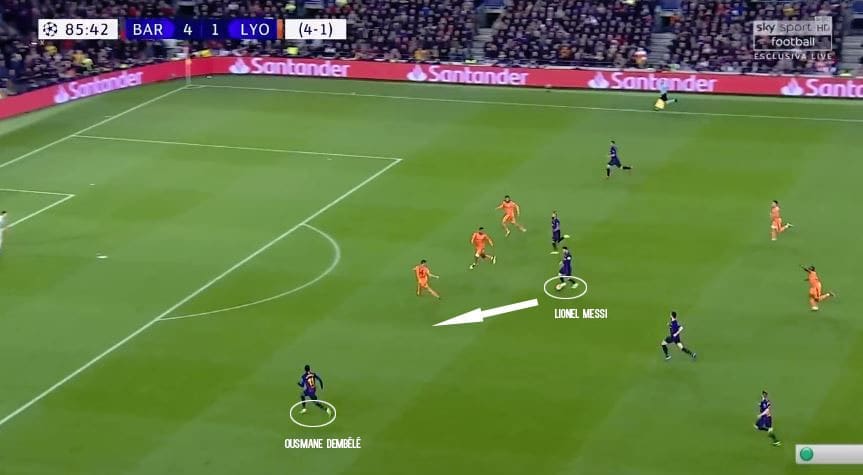
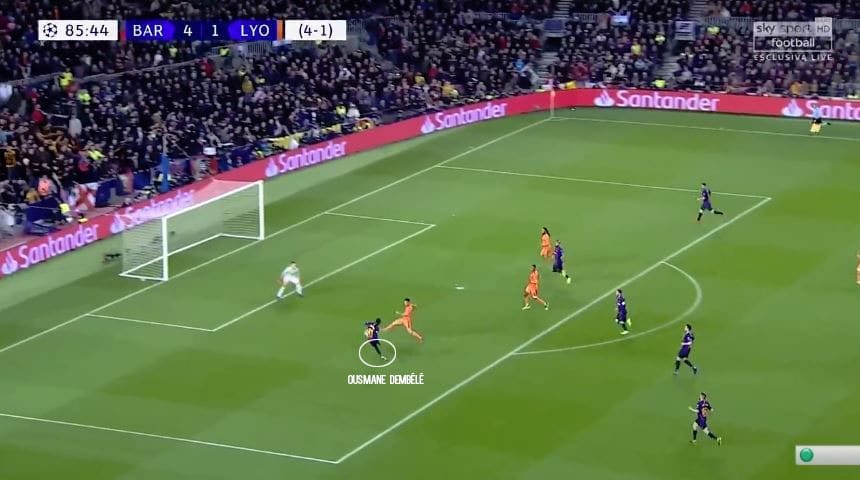
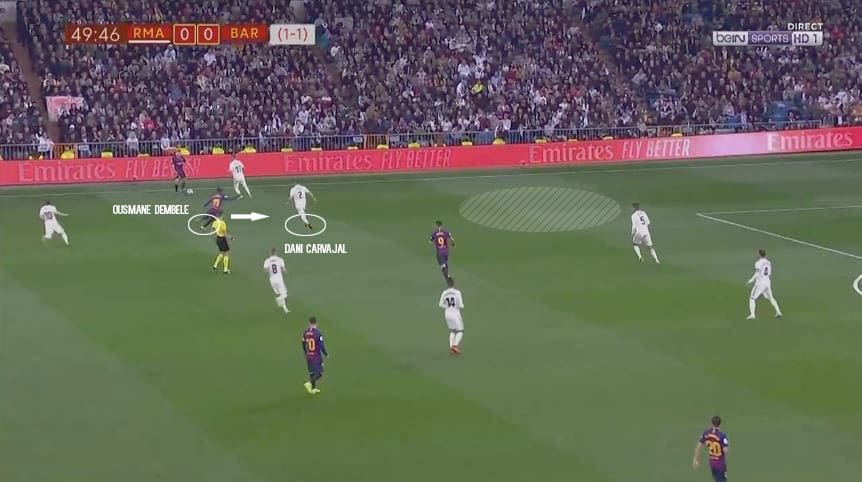
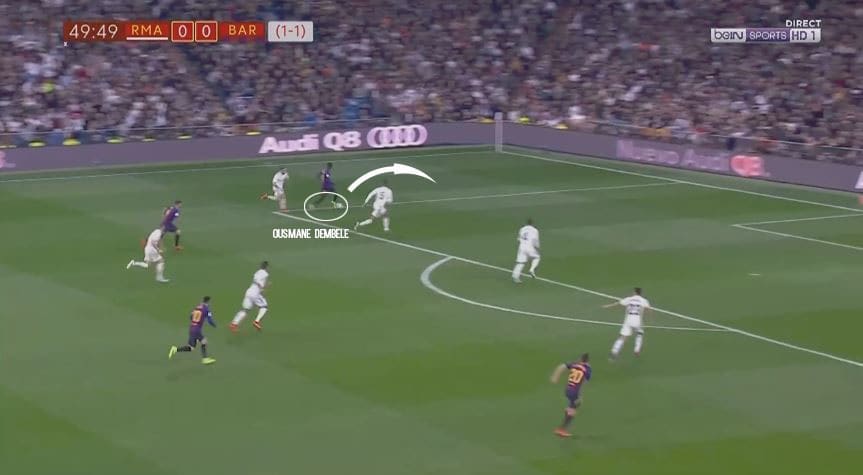
Here we can see how Barcelona dominate possession against Real Madrid trying to find a way through the Madrid defence. Dembélé plays a give-and-go with Jordi Alba, managing to use his blistering pace to get in behind Dani Carajval. Instead of aimlessly crossing into the six-yard area, he intelligently picks out the runs of Suárez and Messi who are both making late runs from deep.
Manchester United’s keys to success
At Old Trafford, Barcelona had joy on the left-hand side with Alba and Messi getting in behind Ashley Young. The United full-back was tormented time and time again defensively being dispossessed on 30 different occasions. For Manchester United, they need to provide more protection to their right-hand side and try to create overloads out of possession. The 3-5-2 formation can allow Manchester United the tactical flexibility to make those adjustments.
Using a combination of a central midfielder, full-back and centre-back, Manchester United could nullify the attacking threats that Barcelona pose out wide by creating overloads. Creating central overloads forces the Catalan side to find an outlet out wide and resort to crosses. Although they are proficient ball crossers, the full-backs won’t have any obvious targets. Nélson Semedo and Jordi Alba will once again be critical to Barcelona’s playing style looking to combine with Messi and Suárez in attack.
Moving forward
In attack, the two full-backs in Diego Dalot and Young were used to create width and crossing opportunities for Lukaku to profit from in the first leg. The major advantage for Manchester United is their physical presence in attack. The Belgian was able to collect long balls from David De Gea and play in the two full-backs along with Rashford supporting to create overloads in the half-spaces.
Manchester United will want to repeat this at the Camp Nou. Being their major attacking advantage, United will need to keep the central areas compact whilst winning the ball back in the wide areas to be able to counter-attack through the full-backs.
Double pivot
Manchester United’s two midfielders Fred and McTominay performed superbly putting in all-round performances. The two combined and played close to each other as a double pivot with Paul Pogba supporting. When one pushed up to press, the other would drop off and attempt to catch the runner.
This prevented Barcelona from being able to effectively play through the middle. Any attack that Manchester United had involved two of three central midfielders slightly higher up to press with one always holding back to prevent a swift counter-attack.
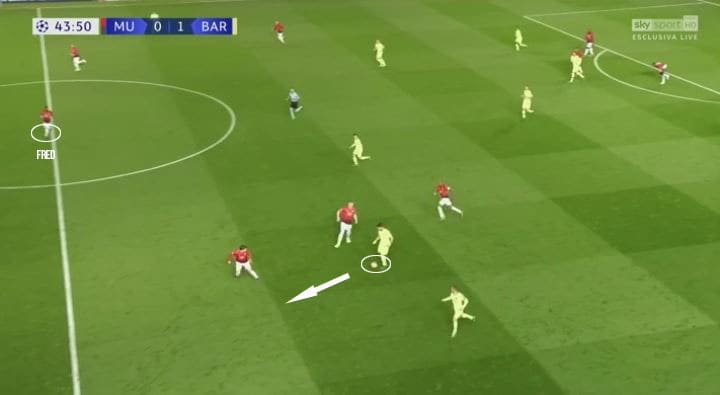
In this example, we can see McTominay has pushed up alongside Pogba but once Barcelona start counter-attacking Fred is already in a position to sweep the area in front of his defensive line. This allows Pogba and McTominay time to drop back and provide extra support as they get back into position.
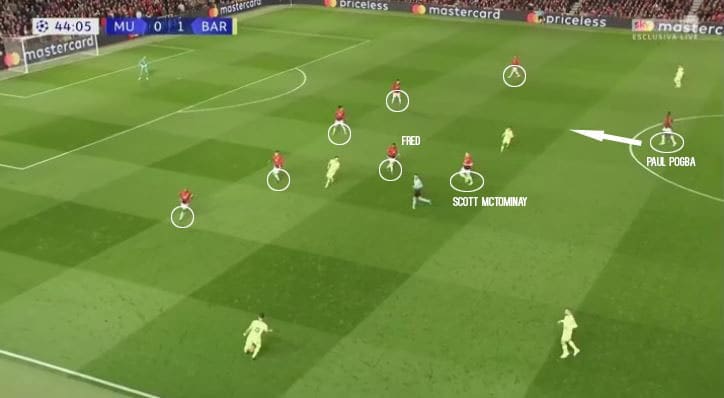
Even in this example, you can see Solskjær’s philosophy of trying to stifle any movement through the middle with the team organised and disciplined in their shape. Creating an 8v4 situation with the banks of defence and midfield closely placed leaves very little room to play around and allow for smaller overloads to take place. Being forced into a more defensive shape in the full-back areas could allow for Manchester United to be more compact and potentially negate Alba and Semedo’s combination play with the two strikers.
Final say
The second leg will prove to be a pivotal moment in the season for both sides. For Manchester United, it represents a chance to continue their fairytale run in the Champions League while they challenge for a top-four position domestically. For Barcelona, this represents a chance to take one more step towards recapturing European glory in a competition they haven’t bested since 2015. Ernesto Valverde’s men have more or less secured the La Liga title and have all their attention focused on the Champions League.
With Manchester United producing an impressive display under the circumstances in the first leg, the power of Barcelona may prove to be too strong for the Red Devils to overcome in Spain. The English club will have to be a bit more expansive as they chase a necessary goal, which will leave spaces open. A 2-1 win to Barcelona seems to be a likely outcome.
If you love tactical analysis, then you’ll love the digital magazines from totalfootballanalysis.com – a guaranteed 100+ pages of pure tactical analysis covering topics from the Premier League, Serie A, La Liga, Bundesliga and many, many more. Buy your copy of the April issue for just ₤4.99 here, or even better sign up for a ₤50 annual membership (12 monthly issues plus the annual review) right here.

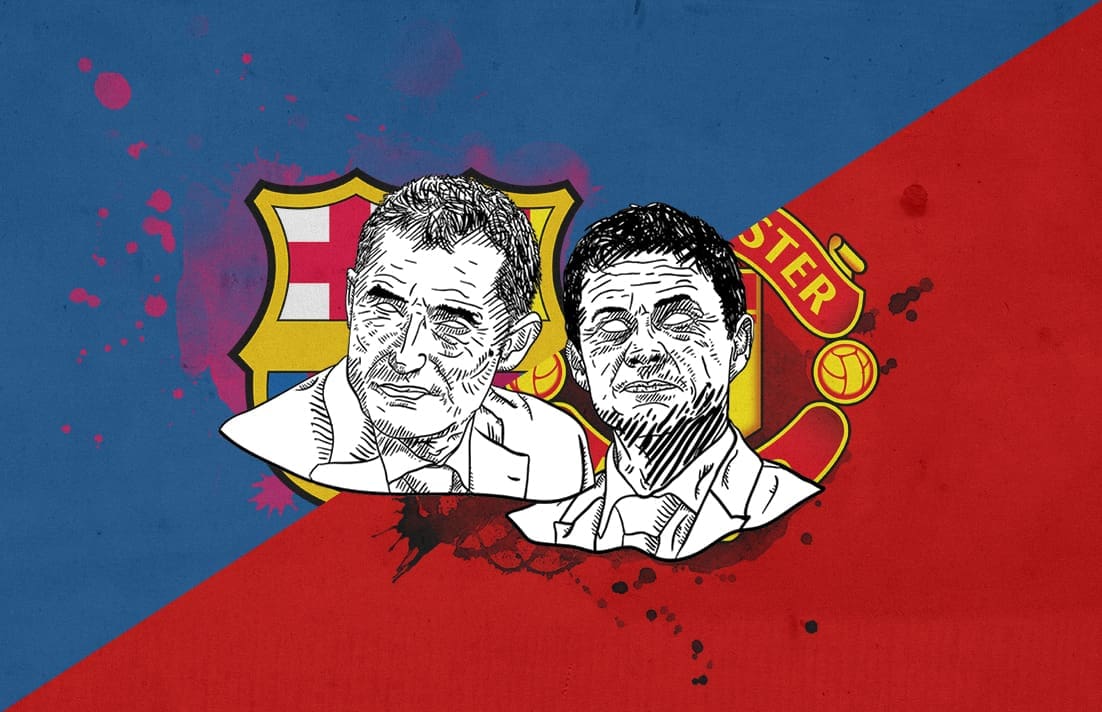




Comments